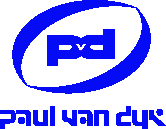

 |
Up to 2000. . . PAUL VAN DYK started 1999 with a big hit - his new remix of Humate's 'Love Stimulation'. He finished it with long-awaited new material in the form of the double a-side 'Another Way'/'Avenue', which turned out to be his third successive UK Top 40 hit. It was a year that could hardly have gone wrong after he kicked it off with a live New Year's Eve/Day triple-header, playing to packed clubs in Milton Keynes, Stoke and Sheffield between midnidght and 6am, and still getting home in time for lunch. And is he exhausted? Is he bollocks! He's only just starting. In 1999, Paul van Dyk's music blew craters across a landscape much wider than anyone might have thought when the fledgling DJ emerged from the Berlin dance scene. 'Vorsprung Dyk Technik', his acclaimed triple-CD remix collection of last year, came in the wake of his first Top 40 hit, 'For An Angel '98', which entered the national charts in August at number 28 and spent four weeks in the top 75 and two weeks at number one in the dance chart. In a hectic 1998, during which 'For An Angel' not only hit the charts but also appeared on a mind-boggling variety of TV and radio shows - from the fairly-predictable MTV to the less-predictable Grandstand, Paul also enjoyed ten top 40 hits as a remixer. He was voted 6th best DJ in DJ magazine's authoritative end-of-year chart. He won Bassline magazine's Best International DJ award. He was voted Best International DJ in Northern Ireland's BBM magazine. He was nominated for Best International DJ in the 1998 Muzik awards and, among his many DJing road rips, he established a residency at New York's Twilo Club (Sasha, Digweed and Carl Cox are the other 'residents'). His acclaimed 1997 album 'Seven Ways' spawned three singles that year, 'Beautiful Place', 'Forbidden Fruit' and 'Words', which reached numbers 83, 69 and 54 respectively - laying a cornerstone for his current success. So where did all this start? Well, in Eisenhüttenstadt in the old East Germany: a state where the premier Erich Honecker reacted to the Soviet policy of glasnost with the retort, "If your neighbour redecorated his flat, would you redecorate yours?", and freedom of movement and creative activity were destinies less likely than a lifelong career in a Trabant factory, labouring under the impression that Western music stopped with The Beatles and Elton John. Paul van Dyk - favourite group, New Order - spent his last few years in this dying outpost of state-control socialism developing, but unable to feed properly, a growing appetite for house music, which he first heard on western radio in 1985. He taught himself to mix on "two fucked-up old turntables and a very old mixer". However, like those of many of his compatriots, his ambitions seemed unlikely to be fulfilled. But seismic political and social upheavals throughout eastern Europe led to the fall in 1989 of the Berlin Wall and, as East and West Germany headed towards reunification, far-reaching reforms in the East permitted adventurous souls to up anchor and set off for whatever and wherever they fancied - in Paul's case, the organically expanding and occasionally exploding rave/club scene in Berlin, where he arrived armed only with his primitive mix tapes and started DJing in March 1991. The Berlin scene was moving
at a hectic pace but Paul van Dyk was moving even faster and
it took little time for his unique blend of uplifting trance
and progressive house to establish him as one of the leading
DJs on the reborn city's vibrant club scene. He became
resident at Dubmission at The men to realise this first were Mark Reeder (ex-pat Mancunian) and Torsten Jurk (East German cohort) - both refugees from the DDR who were busy recording the new music of Berlin and its environs on their MFS label. They encouraged Paul to take the step into the studio and the first result was the Visions Of Shiva project, cooked up with keyboard maestro Cosmic Baby, and coming up with two acclaimed singles, 'Perfect Day'(1992) and 'How Much Can You Take?' (1993). Visions faded, but Paul went on to become an MFS artist in his own right, debuting with 1994's 'Green Valley' EP and following through with the '45 RPM' album later that year. Demand also grew for his talents as a remixer. From '93 onwards, he could be found sprinkling the fairy dust on tracks by artists as obscure as MFS labelmates Humate and DFM, as unlikely as Madchester survivors Inspiral Carpets (another of the young PvD's favourite listens in DDR days) and as big as New Order, Tori Amos and Dina Carroll - fabulous remixes that can be found on 'Vorsprung Dyk Technik'. And all the while he built his international reputation as a brilliant and innovative live DJ, both in Europe and the States. Paul van Dyk's soulful music is informed as much by the raw melancholy of the New Order and Smiths records he listened to while holed up in Eisenhüttenstadt as by the house and techno that led him up the road to Berlin and beyond. His prescient records are informed by the knowledge that electronic music must convey emotion if it is to swerve anonymity and earn the love of a broad public rather than the casual attention of a one-night stand club crowd. His Deviant releases represent the foundations of a body of work which will long outlive even the cream of any year's fashionable dance genre. Long unarguably the top DJ in Germany, he has not been bound by the German scene - rather, he's become a worldwide ambassador for it and a personal embodiment of its qualities. He maintains a home base in Berlin, but wherever you are, he will be with you soon. |
|
PAUL VAN DYK 1992 1993 1994 1995 1996 1997 1998 1999 2000
|